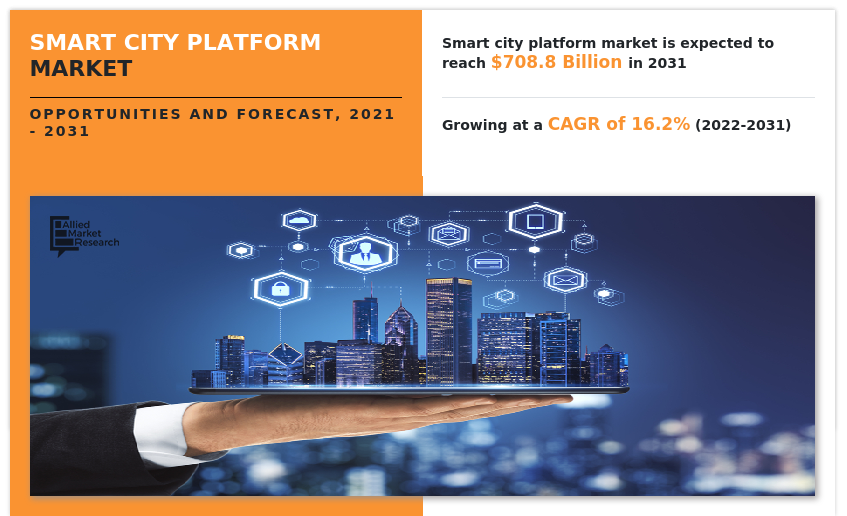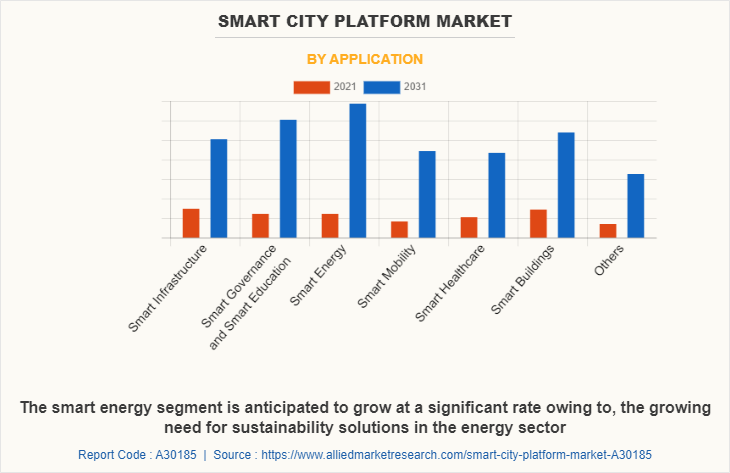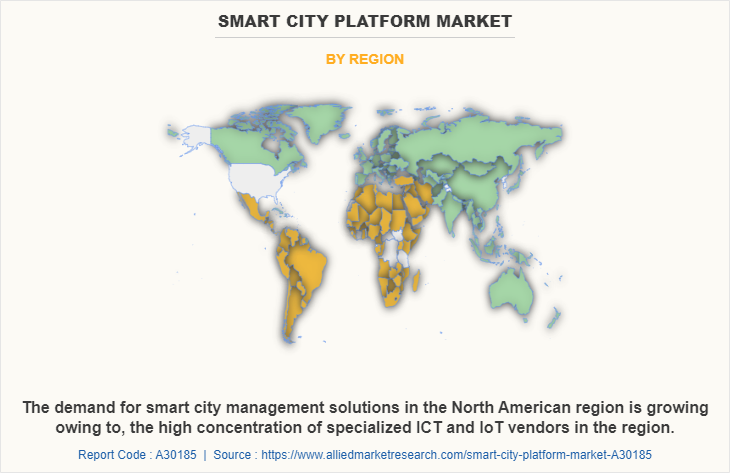Smart City Platform Market Insights, 2031
The global smart city platform market size was valued at USD 160.2 billion in 2021, and is projected to reach USD 708.8 billion by 2031, growing at a CAGR of 16.2% from 2022 to 2031.
Surge in adoption of smart cities in multiple regions is driving the market for smart city platform market. Moreover, a growing number of projects under various government smart city initiatives and rise in need for better natural resource management in urban environments are further anticipated to support the growth of smart city platform industry. In addition, growth in the need for public safety and security fuels the growth of the smart city platform market. However, security concerns associated with smart cities and lack of funding and adequate infrastructure limit the growth of this market. Conversely, the emergence of artificial intelligence in smart cities and rise in the IoT market and its application in smart cities are anticipated to provide numerous opportunities for the expansion of the market during the forecast period.

Smart city platform offers a basis for encouraging participation, dialogue, and collaboration between citizens and government through new technologies and digital channels. In addition, several small municipalities have adopted and installed smart meters to measure electric power consumption, to the handful of large metropolises that have adopted a far-reaching and broad array of systems and technologies for critical management and monitoring operations, aiding in the functioning of the complex smart city applications. These can include smart city lighting, building automation systems, emergency management systems, security and access control systems, intelligent grids, renewable power, water treatment and supply, transportation, and more.
The smart city platform market is segmented on the basis of offerings, deployment model, application, and region. By offerings, the market is bifurcated into platform and service. By deployment model, the market is segmented into on-premise and cloud. Based on application, the market is divided into smart infrastructure, smart governance and smart education, smart energy, smart mobility, smart healthcare, smart building, and others. Region-wise, it is analyzed across North America, Europe, Asia-Pacific, and LAMEA.
The key players profiled in the smart city platform market analysis are Alibaba Group Holding Limited, Amazon Web Services, Inc., Bosch.IO GmbH, Quantela, Inc., Cisco Systems, Inc., Telefonaktiebolaget LM Ericsson, Fujitsu Limited, Fybr, Google LLC, Hitachi, Ltd., Huawei Technologies Co., Ltd., International Business Machines Corporation, Intel Corporation, KaaIoT Technologies, LLC, Microsoft Corporation, NEC Corporation, Oracle Corporation, and SAP SE. These players have adopted various strategies to increase their market penetration and strengthen their position in the industry.
In terms of applications, the smart infrastructure segment dominated the smart cities market share in 2021, and is expected to continue this trend during the forecast period. The growth in digital disruption in people's everyday lifestyles contributes to the growth in demand for smart infrastructure solutions. Moreover, the severe supply chain disruption during the pandemic has further empowered the growth of the segment as businesses rely on smart infrastructure solutions for efficient management of their resources.
However, the smart energy segment is expected to witness the highest growth in the upcoming years, as the demand for IoT powered energy applications, such as smart grids and smart meters are on a rise. Furthermore, numerous government initiatives that support the implementation of smart energy solutions are expected to drive the smart energy market segment.

Region-wise, the smart city platform market was dominated by North America in 2021 and is expected to retain its position during the forecast period, owing to the presence of a highly developed ICT sector and high spending that aid in the growth of the smart city platform market in the region. However, Asia-Pacific is expected to witness significant growth during the forecast period, owing to various government initiatives and digital transformation trends within the region, which is expected to fuel the market growth in this region.

The report focuses on growth prospects, restraints, and trends of the global Smart City Platform market analysis. The study provides Porter’s five forces analysis to understand the impact of various factors, such as the bargaining power of suppliers, competitive intensity of competitors, threat of new entrants, threat of substitutes, and bargaining power of buyers, on the global Smart City Platform market share.
Top Impacting Factors
Increasing government smart city initiatives
Globally, governments have been playing a major role in the smart city platform industry through their various supporting regulations and initiatives focused on the deployment of smart services as a major part of their infrastructure. For instance, in March 2012, the U.S. government announced the launch of the General Services Administration’s (GSA) Smart Buildings, the GSA initiative was aimed to reduce costs and promote smart services with modernized federal government buildings through connected technologies. Similarly, the Europe smart city platform market is expected to grow at a significant rate due to its focus on energy and climate objectives. Therefore, the government is focusing on the distribution of energy with efficient models and strategies for progressing toward a low carbon future in this region, which in turn is promoting the need for effective smart city management solutions.
Moreover, governments in emerging economies, such as China, South Korea, Dubai, India, Singapore, and Japan, are funding various smart city development projects for their economies, which is anticipated to boost the demand for smart city management platform solutions in the region. For instance, in October 2020, China had over 500 smart city pilot projects, which is a huge investment by the government in the region. Furthermore, Dubai’s goal to achieve the objective of the Smart Dubai Plan 2021 for transforming their country into a 100% paperless government has fueled the adoption of smart services in the country. Such factors are driving the growth of the smart city platform industry.
Growing sustainability demands
The global population is urbanizing and increasing at a rapid pace. According to an article published by the United Nation’s Revision of World Urbanization Prospects 2020, it was estimated that around 9 billion people were expected to live in cities or urban centers by 2050, which will be the major factor leading to resource scarcity in the upcoming years.
Moreover, as densely populated cities drive the economic growth in most of countries, urbanization is projected to increase further in the near future, which further supports the growth of the smart city platform market. Furthermore, to cope up with rising urbanization trends and climate change concerns, innovation and digital technology must be leveraged to minimize energy consumption and improve quality of life. Also, innovation must be combined with energy, digital technology, and information and communications technology to address urbanization challenges and ensure sustainability, which is expected to drive smart city platform market growth in the near future.
COVID-19 Impact Analysis
The alarming increase in COVID-19 cases has compelled many businesses and their employees to adjust to remote working and work-from-home standards, which lead to a boost in the demand for automation and IoT solutions in many business sectors as well as personal lives of individuals. Moreover, with the outbreak of COVID-19, businesses have been forced to shift their attention and increase their remote operations, further fueling the demand for smart city platforms, post the outbreak of the pandemic. In addition, smart city platforms helped cities and local governments to deploy smart monitoring solutions in heavily crowded public places. Such factors influenced the demand for smart city management platforms, supporting the growth of smart city platform market during the period.
Key Benefits For Stakeholders
- This report provides a quantitative analysis of the smart city platform market forecast, current trends, estimations, and dynamics of the smart city platform market analysis from 2021 to 2031 to identify the prevailing smart city platform market opportunities.
- The market research is offered along with information related to key drivers, restraints, and opportunities.
- Porter's five forces analysis highlights the potency of buyers and suppliers to enable stakeholders make profit-oriented business decisions and strengthen their supplier-buyer network.
- In-depth analysis of the smart city platform market segmentation assists to determine the prevailing market opportunities.
- Major countries in each region are mapped according to their revenue contribution to the global market.
- Market player positioning facilitates benchmarking and provides a clear understanding of the present position of the market players.
- The report includes the analysis of the regional as well as global smart city platform market trends, key players, market segments, application areas, and market growth strategies.
Smart City Platform Market Report Highlights
| Aspects | Details |
| By Offerings |
|
| By Deployment Model |
|
| By Application |
|
| By Region |
|
| Key Market Players | Alibaba Group Holding Limited, KaaIoT Technologies, LLC., Huawei Technologies Co., Ltd., Oracle Corporation, NEC Corporation, Quantela, Inc., SAP SE, Intel Corporation, Fujitsu Limited, Bosch.IO GmbH, International Business Machines Corporation, Fybr, Microsoft Corporation, Google LLC, Telefonaktiebolaget LM Ericsson, Cisco Systems, Inc., Amazon Web Services, Inc., Hitachi, Ltd. |
Analyst Review
Owing to growing adoption of smart city projects, demand for smart city platforms is expected to surge during the forecast period. A smart city platform provides the integral capability to provide coordination of data, applications and services that are across the operational domain. Vendors are focused on the development of compatible platforms through multiple partnerships and to ensure the platform meets the need of future conditions of the environment, economy, and services. IoT platforms are an essential part of the smart city ecosystem
Key providers of the smart city platform market, such as Alibaba, SAP SE, and Cisco Systems, Inc. account for a significant share of the market. With the larger requirement from the corporate culture, various brands are adopting strategies, such as product launches and development to automate and simplify data management. For instance, in May 2021, SAP SE launched “smart sensing” capabilities. Smart sensing technology helps not just to exchange this information between physical objects and enterprise applications, but to track the associated business objects to automatically steer process steps and actions. Cloud technology enables not only the possibility to process large numbers of scanning events in parallel, but also provides a powerful decision and rules engine to “translate” insights to actions, allowing customers to leverage intelligence at almost every business process they can imagine.
Furthermore, in June 2022, Cisco expanded its relationship with General Dynamics Information Technology, a business unit of General Dynamics to deliver Cisco Private 5G services to a broad set of government entities. In addition, with the increasing demand for getting instant solutions to the problem with all the resourceful insights, companies such as Cisco System, Inc. have performed strategic product launches to help end users. For instance, in July 2022, Cisco launched a new Webex Wholesale Route-to-Market (RTM) for service provider partners to address the evolving needs of SMBs. The new sales model includes a single commercial agreement with each partner and a self-service platform for service provider to deliver managed services for Webex, as well as the agility, scalability and flexibility to create their own co-branded offers.
The global smart city platform market size was valued at $160.23 billion in 2021, and is projected to reach $708.78 billion by 2031.
The global smart city platform market is projected to grow at a compound annual growth rate of 16.2% from 2022 to 2031 to reach USD 708.8 billion by 2031
The key players profiled in the smart city platform market analysis are Alibaba Group Holding Limited, Amazon Web Services, Inc., Bosch.IO GmbH, Quantela, Inc., Cisco Systems, Inc., Telefonaktiebolaget LM Ericsson, Fujitsu Limited, Fybr, Google LLC, Hitachi, Ltd., Huawei Technologies Co., Ltd., International Business Machines Corporation, Intel Corporation, KaaIoT Technologies, LLC, Microsoft Corporation, NEC Corporation, Oracle Corporation, and SAP SE.
North America is the largest regional market for smart city platforms.
The smart city platform market is driven by increasing urbanization, demand for efficient resource management, advancements in IoT and AI technologies, and growing government initiatives for smart infrastructure.
Loading Table Of Content...



